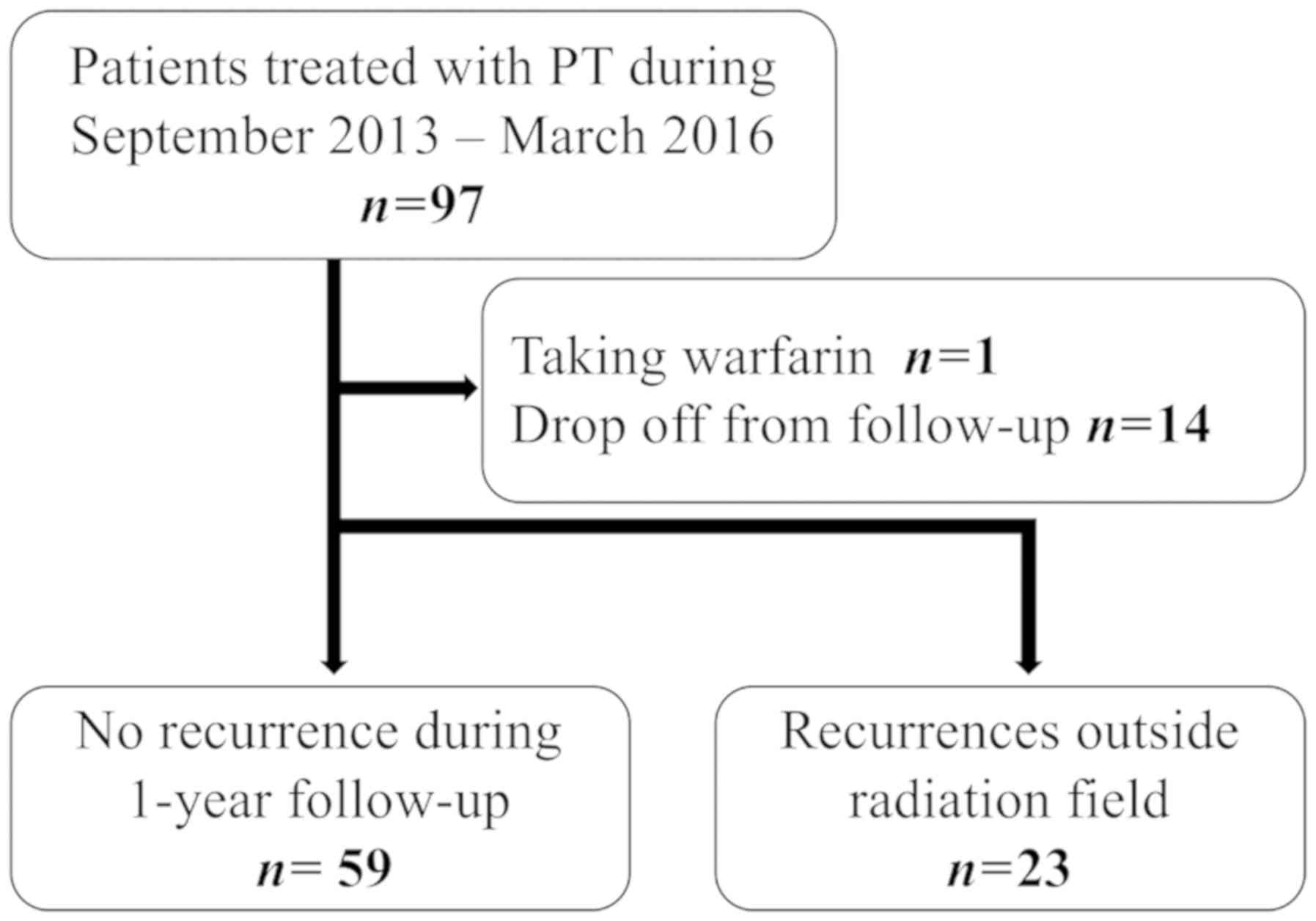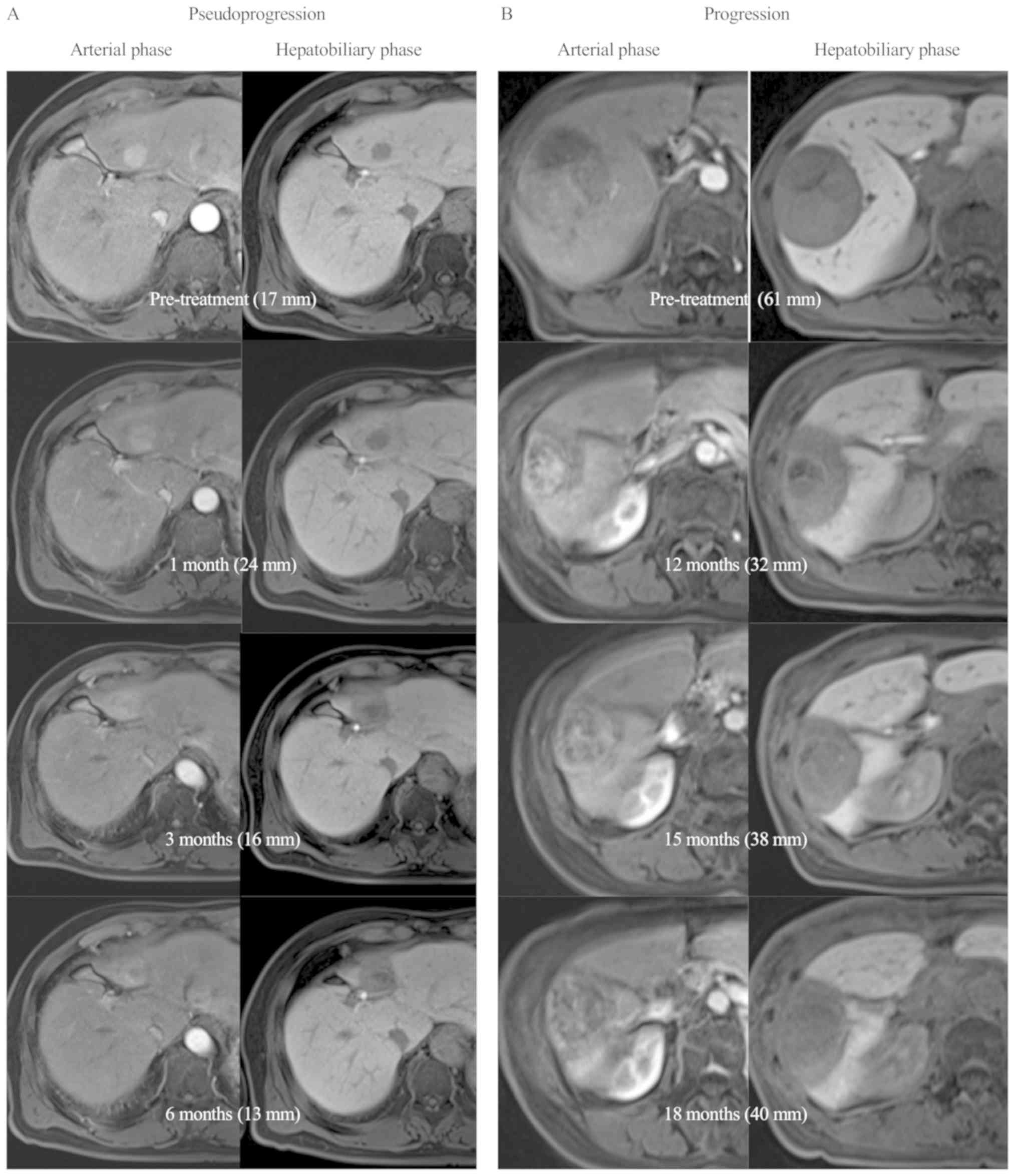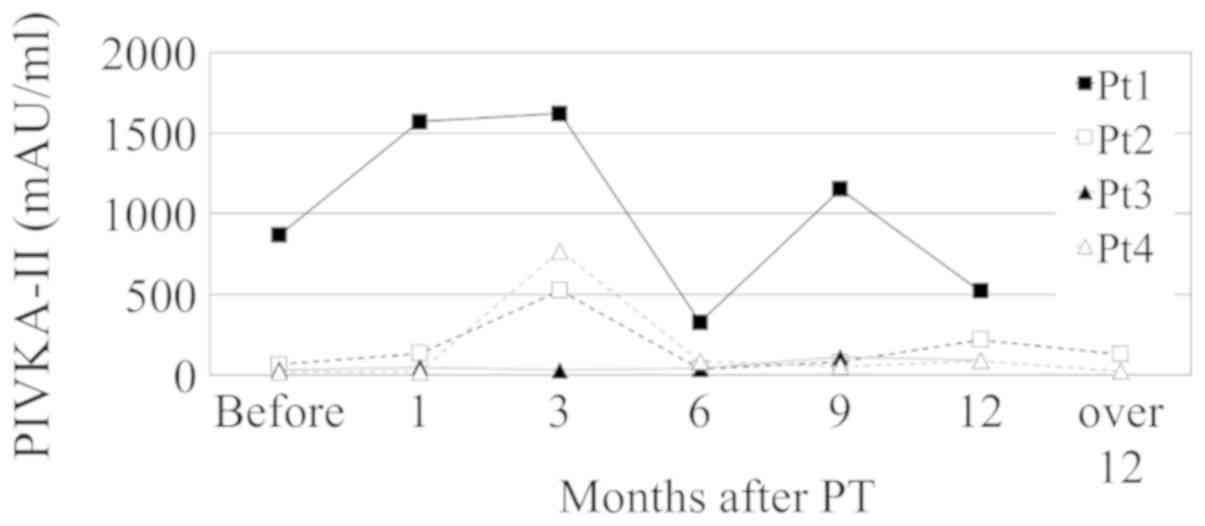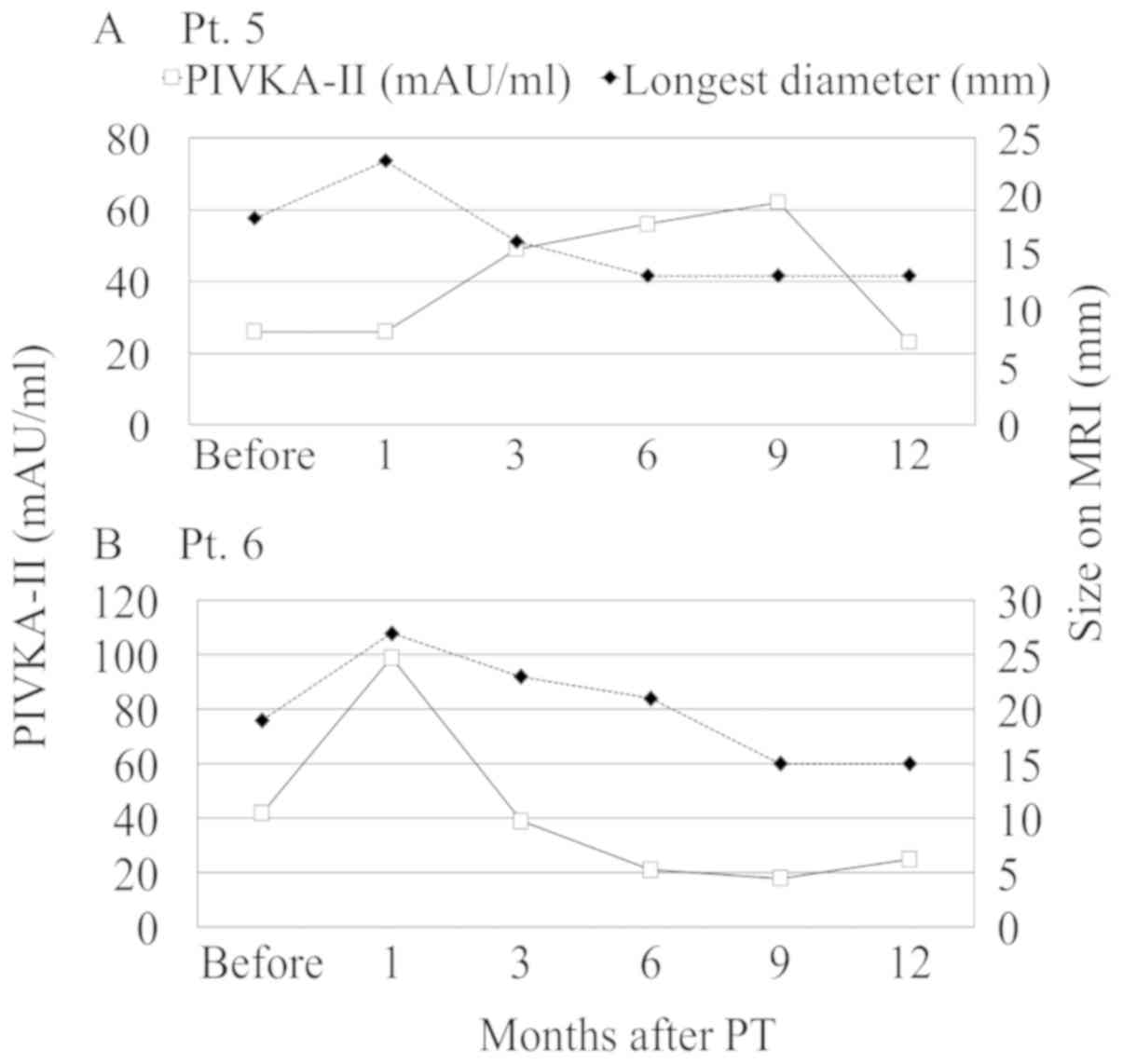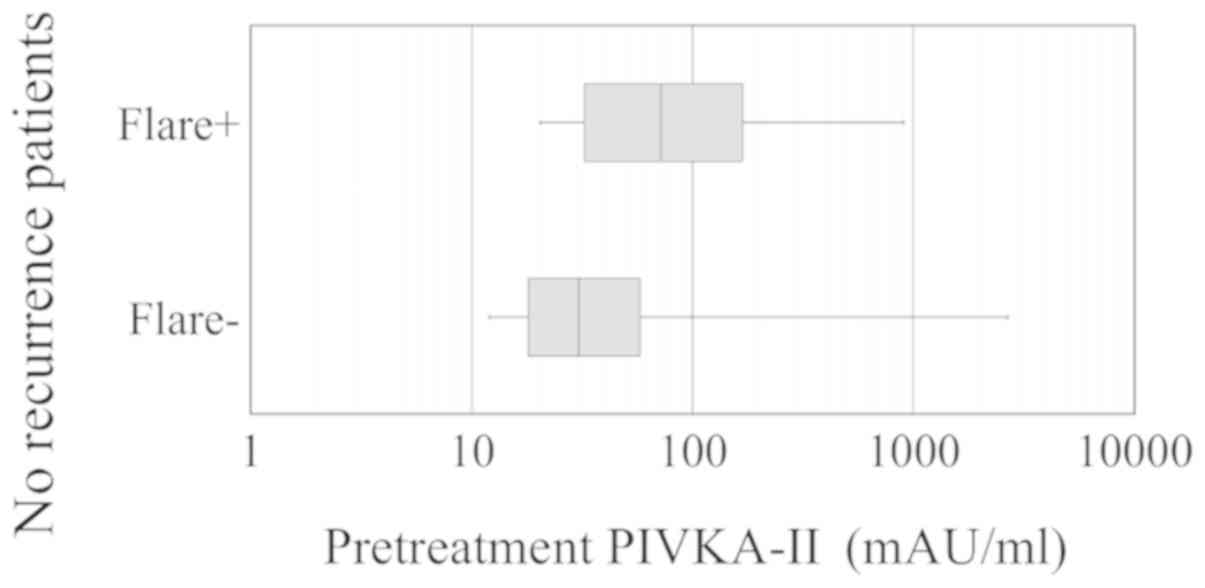|
1
|
Ferlay J, Soerjomataram I, Dikshit R, Eser
S, Mathers C, Rebelo M, Parkin DM, Forman D and Bray F: Cancer
incidence and mortality worldwide: Sources, methods and major
patterns in GLOBOCAN 2012. Int J Cancer. 136:E359–E386. 2015.
View Article : Google Scholar : PubMed/NCBI
|
|
2
|
Osaki Y and Nishikawa H: Treatment for
hepatocellular carcinoma in Japan over the last three decades: Our
experience and published work review. Hepatol Res. 45:59–74. 2015.
View Article : Google Scholar : PubMed/NCBI
|
|
3
|
Llovet JM, Burroughs A and Bruix J:
Hepatocellular carcinoma. Lancet. 362:1907–1917. 2003. View Article : Google Scholar : PubMed/NCBI
|
|
4
|
Sakurai H, Ishikawa H and Okumura T:
Proton beam therapy in Japan: Current and future status. Jpn J Clin
Oncol. 46:885–892. 2016. View Article : Google Scholar : PubMed/NCBI
|
|
5
|
Fukuda K, Okumura T, Abei M, Fukumitsu N,
Ishige K, Mizumoto M, Hasegawa N, Numajiri H, Ohnishi K, Ishikawa
H, et al: Long-term outcomes of proton beam therapy in patients
with previously untreated hepatocellular carcinoma. Cancer Sci.
108:497–503. 2017. View Article : Google Scholar : PubMed/NCBI
|
|
6
|
Tabrizian P, Jibara G, Shrager B, Schwartz
M and Roayaie S: Recurrence of hepatocellular cancer after
resection: Patterns, treatments, and prognosis. Ann Surg.
261:947–955. 2015. View Article : Google Scholar : PubMed/NCBI
|
|
7
|
Chan AC, Chan SC, Chok KS, Cheung TT, Chiu
DW, Poon RT, Fan ST and Lo CM: Treatment strategy for recurrent
hepatocellular carcinoma: Salvage transplantation, repeated
resection, or radiofrequency ablation? Liver Transpl. 19:411–419.
2013. View
Article : Google Scholar : PubMed/NCBI
|
|
8
|
Midorikawa Y, Takayama T, Higaki T,
Nakayama H, Yamamoto M, Ariizumi S, Shimada K, Kokudo N, Tsuji S,
Tsuchiya K, et al: Early hepatocellular carcinoma as a signaling
lesion for subsequent malignancy. Jpn J Clin Oncol. 46:1102–1107.
2016. View Article : Google Scholar : PubMed/NCBI
|
|
9
|
Kudo M, Izumi N, Kokudo N, Matsui O,
Sakamoto M, Nakashima O, Kojiro M and Makuuchi M; HCC Expert Panel
Of Japan Society Of Hepatology, : Management of hepatocellular
carcinoma in Japan: Consensus-based clinical practice guidelines
proposed by the Japan society of hepatology (JSH) 2010 updated
version. Dig Dis. 29:339–364. 2011. View Article : Google Scholar : PubMed/NCBI
|
|
10
|
The Japan Society of Hepatology: Clinical
practice guidelines for hepatocellular carcinoma (2013 version).
https://www.jsh.or.jp/English/guidelines_en/Guidelines_for_hepatocellular_carcinoma_2013
|
|
11
|
Kim HJ, Lee KW, Kim YJ, Oh DY, Kim JH, Im
SA and Lee JS: Chemotherapy-induced transient CEA and CA19-9 surges
in patients with metastatic or recurrent gastric cancer. Acta
Oncol. 48:385–390. 2009. View Article : Google Scholar : PubMed/NCBI
|
|
12
|
Mundle SD, Marathe AS and Chelladurai M:
Transient therapy-related surge in serum tumor biomarkers:
Characterizing behavior and postulating its biologic role. Crit Rev
Oncol Hematol. 86:15–22. 2013. View Article : Google Scholar : PubMed/NCBI
|
|
13
|
Venniyoor A, Al Bahrani B and Rajan B: The
dilemma of serum tumor marker (STM) flares. Gulf J Oncolog.
1:63–67. 2014.PubMed/NCBI
|
|
14
|
Therasse P, Arbuck SG, Eisenhauer EA,
Wanders J, Kaplan RS, Rubinstein L, Verweij J, Van Glabbeke M, van
Oosterom AT, Christian MC and Gwyther SG: New guidelines to
evaluate the response to treatment in solid tumors. European
organization for research and treatment of cancer, national cancer
institute of the United States, national cancer institute of
canada. J Natl Cancer Inst. 92:205–216. 2000. View Article : Google Scholar : PubMed/NCBI
|
|
15
|
Iwata H, Ogino H, Hashimoto S, Yamada M,
Shibata H, Yasui K, Toshito T, Omachi C, Tatekawa K, Manabe Y, et
al: Spot scanning and passive scattering proton therapy: Relative
biological effectiveness and oxygen enhancement ratio in cultured
cells. Int J Radiat Oncol Biol Phys. 95:95–102. 2016. View Article : Google Scholar : PubMed/NCBI
|
|
16
|
Toshito T, Omachi C, Kibe Y, Sugai H,
Hayashi K, Shibata H, Yasui K, Tanaka K, Yamamoto T, Yoshida A, et
al: A proton therapy system in nagoya proton therapy center.
Australas Phys Eng Sci Med. 39:645–654. 2016. View Article : Google Scholar : PubMed/NCBI
|
|
17
|
Nakajima K, Iwata H, Ogino H, Hattori Y,
Hashimoto S, Nakanishi M, Toshito T, Umemoto Y, Iwatsuki S,
Shibamoto Y and Mizoe JE: Acute toxicity of image-guided
hypofractionated proton therapy for localized prostate cancer. Int
J Clin Oncol. 23:353–360. 2018. View Article : Google Scholar : PubMed/NCBI
|
|
18
|
Hashimoto S, Shibamoto Y, Iwata H, Ogino
H, Shibata H, Toshito T, Sugie C and Mizoe JE: Whole-pelvic
radiotherapy with spot-scanning proton beams for uterine cervical
cancer: A planning study. J Radiat Res. 57:524–532. 2016.
View Article : Google Scholar : PubMed/NCBI
|
|
19
|
Kanda Y: Investigation of the freely
available easy-to-use software ‘EZR’ for medical statistics. Bone
Marrow Transplant. 48:452–458. 2013. View Article : Google Scholar : PubMed/NCBI
|
|
20
|
Song P, Cai Y, Tang H, Li C and Huang J:
The clinical management of hepatocellular carcinoma worldwide: A
concise review and comparison of current guidelines from 2001 to,
2017. Biosci Trends. 11:389–398. 2017. View Article : Google Scholar : PubMed/NCBI
|
|
21
|
Ueno M, Hayami S, Shigekawa Y, Kawai M,
Hirono S, Okada K, Tamai H, Shingaki N, Mori Y, Ichinose M and
Yamaue H: Prognostic impact of surgery and radiofrequency ablation
on single nodular HCC ≤5 cm: Cohort study based on serum HCC
markers. J Hepatol. 63:1352–1359. 2015. View Article : Google Scholar : PubMed/NCBI
|
|
22
|
Park SJ, Jang JY, Jeong SW, Cho YK, Lee
SH, Kim SG, Cha SW, Kim YS, Cho YD, Kim HS, et al: Usefulness of
AFP, AFP-L3, and PIVKA-II, and their combinations in diagnosing
hepatocellular carcinoma. Medicine (Baltimore). 96:e58112017.
View Article : Google Scholar : PubMed/NCBI
|
|
23
|
Yu R, Tan Z, Xiang X, Dan Y and Deng G:
Effectiveness of PIVKA-II in the detection of hepatocellular
carcinoma based on real-world clinical data. BMC Cancer.
17:6082017. View Article : Google Scholar : PubMed/NCBI
|
|
24
|
Sherman M: Recurrence of hepatocellular
carcinoma. N Engl J Med. 359:2045–2047. 2008. View Article : Google Scholar : PubMed/NCBI
|
|
25
|
Bae JS, Park SJ, Park KB, Paik SY, Ryu JK,
Choi CK and Hwang TJ: Acute exacerbation of hepatitis in liver
cirrhosis with very high levels of alpha-fetoprotein but no
occurrence of hepatocellular carcinoma. Korean J Intern Med.
20:80–85. 2005. View Article : Google Scholar : PubMed/NCBI
|
|
26
|
Xing H, Yan C, Cheng L, Wang N, Dai S,
Yuan J, Lu W, Wang Z, Han J, Zheng Y and Yang T: Clinical
application of protein induced by vitamin K antagonist-II as a
biomarker in hepatocellular carcinoma. Tumour Biol. Oct
13–2016.(Epub ahead of print). View Article : Google Scholar
|
|
27
|
Takamatsu S, Yamamoto K, Maeda Y, Kawamura
M, Shibata S, Sato Y, Terashima K, Shimizu Y, Tameshige Y, Sasaki
M, et al: Evaluation of focal liver reaction after proton beam
therapy for hepatocellular carcinoma examined using Gd-EOB-DTPA
enhanced hepatic magnetic resonance imaging. PLoS One.
11:e01671552016. View Article : Google Scholar : PubMed/NCBI
|
|
28
|
Imada H, Kato H, Yasuda S, Yamada S,
Yanagi T, Hara R, Kishimoto R, Kandatsu S, Minohara S, Mizoe JE, et
al: Compensatory enlargement of the liver after treatment of
hepatocellular carcinoma with carbon ion radiotherapy-relation to
prognosis and liver function. Radiother Oncol. 96:236–242. 2010.
View Article : Google Scholar : PubMed/NCBI
|
|
29
|
Arora A and Kumar A: Treatment response
evaluation and follow-up in hepatocellular carcinoma. J Clin Exp
Hepatol. 4 Suppl 3:S126–S129. 2014. View Article : Google Scholar : PubMed/NCBI
|
|
30
|
Brook OR, Thornton E, Mendiratta-Lala M,
Mahadevan A, Raptopoulos V, Brook A, Najarian R, Sheiman R and
Siewert B: CT imaging findings after stereotactic radiotherapy for
liver tumors. Gastroenterol Res Pract. 2015:1262452015. View Article : Google Scholar : PubMed/NCBI
|
|
31
|
Lencioni R and Llovet JM: Modified RECIST
(mRECIST) assessment for hepatocellular carcinoma. Semin Liver Dis.
30:52–60. 2010. View Article : Google Scholar : PubMed/NCBI
|
|
32
|
Kudo M, Ueshima K, Kubo S, Sakamoto M,
Tanaka M, Ikai I, Furuse J, Murakami T, Kadoya M and Kokudo N;
Liver Cancer Study Group of Japan, : Response evaluation criteria
in cancer of the liver (RECICL) (2015 revised version). Hepatol
Res. 46:3–9. 2016. View Article : Google Scholar : PubMed/NCBI
|















